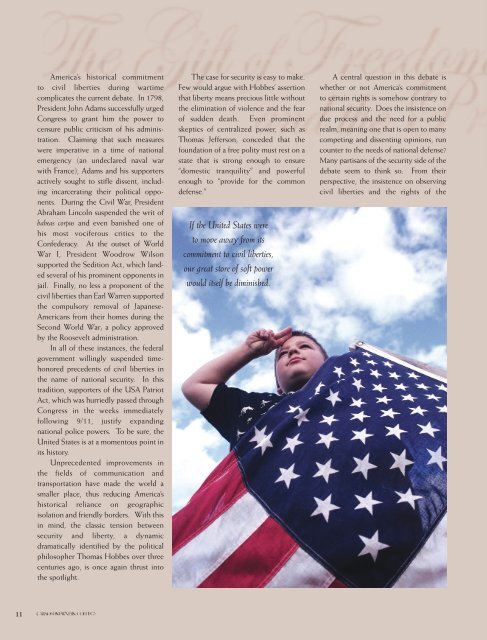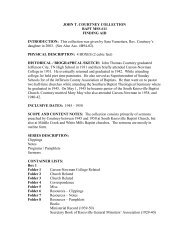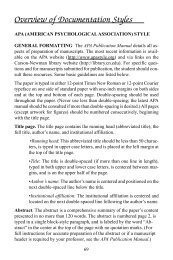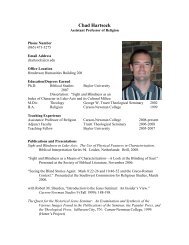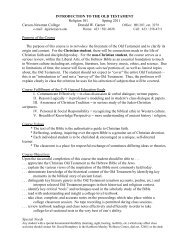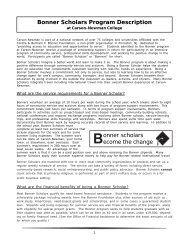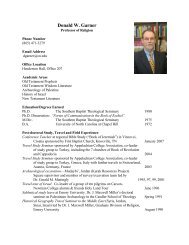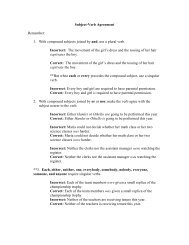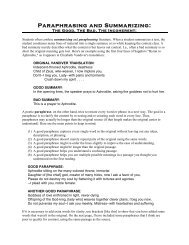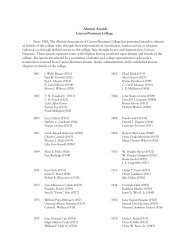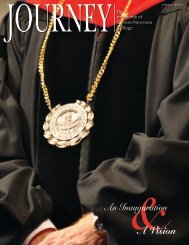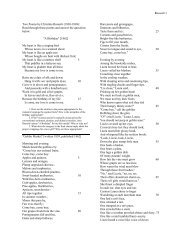America’s historical commitmentto civil liberties during wartimecomplicates the current debate. In 1798,President John Adams successfully urgedCongress to grant him the power tocensure public criticism of his administration.Claiming that such measureswere imperative in a time of nationalemergency (an undeclared naval warwith France), Adams and his supportersactively sought to stifle dissent, includingincarcerating their political opponents.During the Civil War, PresidentAbraham Lincoln suspended the writ ofhabeas corpus and even banished one ofhis most vociferous critics to theConfederacy. At the outset of WorldWar I, President Woodrow Wilsonsupported the Sedition Act, which landedseveral of his prominent opponents injail. Finally, no less a proponent of thecivil liberties than Earl Warren supportedthe compulsory removal of Japanese-Americans from their homes during theSecond World War; a policy approvedby the Roosevelt administration.In all of these instances, the federalgovernment willingly suspended timehonoredprecedents of civil liberties inthe name of national security. In thistradition, supporters of the USA PatriotAct, which was hurriedly passed throughCongress in the weeks immediatelyfollowing 9/11, justify expandingnational police powers. To be sure, theUnited States is at a momentous point inits history.Unprecedented improvements inthe fields of communication andtransportation have made the world asmaller place, thus reducing America’shistorical reliance on geographicisolation and friendly borders. With thisin mind, the classic tension betweensecurity and liberty, a dynamicdramatically identified by the politicalphilosopher Thomas Hobbes over threecenturies ago, is once again thrust intothe spotlight.The case for security is easy to make.Few would argue with Hobbes’ assertionthat liberty means precious little withoutthe elimination of violence and the fearof sudden death. Even prominentskeptics of centralized power, such asThomas Jefferson, conceded that thefoundation of a free polity must rest on astate that is strong enough to ensure“domestic tranquility” and powerfulenough to “provide for the commondefense.”If the United States wereto move away from itscommitment to civil liberties,our great store of soft powerwould itself be diminished.A central question in this debate iswhether or not America’s commitmentto certain rights is somehow contrary tonational security. Does the insistence ondue process and the need for a publicrealm, meaning one that is open to manycompeting and dissenting opinions, runcounter to the needs of national defense?Many partisans of the security side of thedebate seem to think so. From theirperspective, the insistence on observingcivil liberties and the rights of the11
accused seems obsolete in a violentneo-Hobbesian world filled with hatefulextremists bent on the destruction of theUnited States. Although the argumentwas difficult to make with fresh imagesof the exploding WTC towers ineveryone’s mind, the harsh dichotomybetween civil liberties and security may,in fact, be overstated.Instead of viewing the debate asa zero-sum game, where obtainingsecurity means reducing liberty, theentire debate should be recast on a singlescale of national security. In otherwords, explicit efforts to bolster nationalsecurity, such as escalating defensebudgets, the willingness to projectmilitary power overseas, and theexpansion of police powers, should notbe the sole measure of protectingAmerica. In light of the West’s victoryin the Cold War, its distinctive culturaltraits, like the free and open exchange ofideas, should be seen as measures ofnational strength no less powerfulthan the explicit variables mentionedabove. The promise of an opensociety, one where dissenting opinionsare encouraged as a means ofmaintaining the vitality of the nationalconversation, carries its own uniqueclout.As Thomas Friedman pointed outin his wildly popular book onglobalization, The Lexus and the Olive Tree(2000), an open society, where pluralismand diversity of opinion are more thanmerely tolerated but rather activelyencouraged, has many advantages overrepressive societies. The reasons arevaried, but the most important amongthem is the fact that technology churnsso rapidly that information is therebyexchanged at an accelerated pace.Societies that foster a culture ofopenness are far more likely toaccommodate themselves to changingeconomic circumstances and reapbenefits from the effects.Consider the dull and lifelessatmosphere of the Eastern bloc countriesduring the Cold War. Their adherenceto the rigid doctrines of communism andstifled alternative views renderedthem unable to compete in the globaleconomy. Ultimately, the formerlycommunist nations of Eastern Europewere lost by their inability to participate.The ironic lesson from the fall ofcommunism is clear. Efforts to bolsterstability by enforcing conformity toan agreed upon political orthodoxy isactually lethal to economic growth, andtherefore ultimately detrimental to thepolitical doctrine the policies aredesigned to foster.Not to be lost in this instrumentaldefense of civil liberties is the beliefin the natural rights of individuals toexercise their liberty of conscience.From the time Jefferson penned thefamous Declaration proclaimingAmerican nationhood, the world haslooked upon the idealism inherent inthat document as this nation’s mostvaluable gift to the world. The respectthat the Declaration of Independenceelicits from citizens all over the world isAmerica’s most potent source of softpower.Soft power, as Joseph Nye explainsin his book, The Paradox of American Power(2002), is founded on the inspirationalvalue of a nation’s symbols. This iscontrasted with hard power’s reliance onmilitary force as a source of strength.Hard power is clumsy; it can be usedonly with great care and often evokesstrong emotional resentment in areaswhere it is exercised. Soft power, bycontrast, relies on the good will generatedby the respect that others have for thenation in question. Traditionally, theUnited States has been the possessor ofthe most concentrated amount of softpower the world has ever known. Allaround the world others look to Americafor movies, books, music, and mostimportantly, the example of a stablepolitical order where freedom andresponsibility have been effectivelybalanced. If the United States were tomove away from its commitment to civilliberties, our great store of soft powerwould itself be diminished.In today’s dangerous world, theUnited States faces many obstacles.These new challenges make the age-olddebate regarding security and libertyagain relevant to our national dialogue.By looking beyond the false dichotomy—thatsecurity can only be gained byreducing liberty—the debate is at leastpartially clarified and the need tomaintain a civil rights establishment isclear. Only by adhering to the tenants ofpluralism and dissent can we maintainthe open dialogue of ideas that hasfueled America’s beacon of liberty andjustice for all. Just as it has been for morethan 227 years, this is the true source ofCour nation’s strength. NJohn Wells, ‘91, joined C-N’s History andPolitical Sciences faculty in 1994. Palgrave,a division of St. Martin’s Press, will releasehis new book, Civil Liberties and NationalSecurity in an Era of Terrorism, laterthis fall.12


